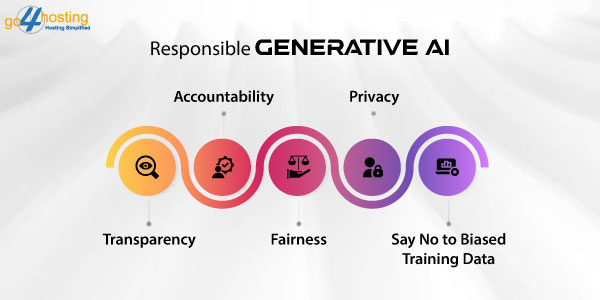Cloud- Protecting You From Threatening Perils of Generative AI

With its launch in November 2022, ChatGPT had gained worldwide attention. Although it was not the first model of generative AI, it brought a hasty curiosity among the crowd. People were in awe of software that could provide them with quick answers, craft content and assist in coding programs. But, after a year, one question has been bugging the experts: is the current generative AI framework secure and reliable?
AI tools like Deepfake, where one can create convincing images, videos and audio hoaxes, have proved to be a dangerous aspect of generative AIs. In 2020, multiple hoax videos of US President Joe Biden were circulated, where he was portrayed in exaggerated states of cognitive decline. These videos were intended to influence the election. Unfortunately, it is one of the few incidents that highlighted the perils of generative AI. If actions are not taken to regulate the capabilities of AI, it can unleash nightmarish scenarios.
Generative AI: The Dark Side
Generative AI has been hailed to be revolutionary, changing the way we work. However, experts are voicing out about the dangers it brings to the world. The hoax videos of US President Joe Biden, as discussed above, are just the tip of the iceberg: AI has the power to alter your perception.
- Social Manipulation
We trust everything we see and hear. But what if a false narrative created by generative AI distorts the reality you perceive? What if someone created a fake video of a terrorist attack that never happened? Imagine the chaos it will create among the public.
Deepfake and AI voice changers are infiltrating the social and political spheres. They are employed to create realistic audio clips, videos and photos and even replace one image with another. In 2022, during the Russian invasion of Ukraine, a video of Ukrainian President Voldomyr Zelensky was released, where he was asking his troops to surrender, creating confusion in warfare.
The power of generative AI to share misinformation and war propaganda and socially manipulate situations can create a nightmarish scenario in the world. Those days are not far when we won’t be able to distinguish what’s real and what’s not.
- Generating Misinformation
Have you ever reviewed the terms of use of ChatGPT? It clearly warns the user that the generated information might not be accurate and they must follow due diligence.
“Artificial intelligence and machine learning are rapidly evolving fields of study. We are constantly working to improve our Services to make them more accurate, reliable, safe and beneficial. Given the probabilistic nature of machine learning, the use of our Services may, in some situations, result in incorrect Output that does not accurately reflect real people, places, or facts. You should evaluate the accuracy of any Output as appropriate for your use case, including by using human review of the Output.”
Even Google Bard admits it shortcoming:
A research by Stanford University and UC Berkeley points out the clear difference between two versions of chatGPT (GPT-3.5 and GPT-4)
“We find that the performance and behavior of both GPT-3.5 and GPT-4 can vary greatly over time. For example, GPT-4 (March 2023) was reasonable at identifying prime vs. composite numbers (84% accuracy) but GPT-4 (June 2023) was poor on these same questions (51% accuracy). This is partly explained by a drop in GPT-4’s amenity to follow chain-of-thought prompting. Interestingly, GPT-3.5 was much better in June than in March in this task. GPT-4 became less willing to answer sensitive questions and opinion survey questions in June than in March. GPT-4 performed better at multi-hop questions in June than in March, while GPT-3.5’s performance dropped on this task. Both GPT-4 and GPT-3.5 had more formatting mistakes in code generation in June than in March. We provide evidence that GPT-4’s ability to follow user instructions has decreased over time, which is one common factor behind the many behavior drifts. Overall, our findings show that the behavior of the “same” LLM service can change substantially in a relatively short amount of time, highlighting the need for continuous monitoring of LLMs.”
The above terms of use and studies reveal the need to double-check every piece of information generated by AI.
- Data Privacy
Did you know that AI also collects your data to customize the user experience and train the model? It raises data privacy and security concerns. Where is the collected data stored, and how is it used?
Mr. Zoe Argento, co-chair of the Privacy and Data Security Practice Group at Littler Mendelson, P.C., in an article for the International Association of Privacy Professionals (IAPP), called out the risks of generative AI and data disclosure concerns, “The generative AI service may divulge a user’s personal data both inadvertently and by design. As a standard operating procedure, for example, the service may use all information from users to fine-tune how the base model analyzes data and generates responses. The personal data might, as a result, be incorporated into the generative AI tool. The service might even disclose queries to other users so they can see examples of questions submitted to the service.”
Several cases have been reported where healthcare professionals enter patient information into the chatbots to generate reports and streamline processes. It leads to exposure of sensitive data to a third-party system that may not be secure. Moreover, the collected data may not even be safe from other user’s access. In 2023, chatGPT allowed some of its users to see titles from other active users’ chat history. Thus raising privacy concerns.
- Ethics and Integrity
Not only political figures, journalists, and technologists, but even religious leaders are also raising the alarm about the dangerous consequences of generative AI. In a 2019 Vatican meeting, Pope Francis warned against the AI circulating tendonitis opinions and false data. “If mankind’s so-called technological progress were to become an enemy of the common good,” he added, “this would lead to an unfortunate regression to a form of barbarism dictated by the law of the strongest.”
Hoax images and videos, hurting religious sentiments, can create a tense environment in the nations.
Responsible Generative AI Framework: Pillar of Supports

Aren’t the above facts alarming?
As artificial intelligence (AI) continues to evolve, the importance of ensuring responsible and ethical use of generative models becomes paramount. It is based five key principles:
1. Transparency
Transparency stands as a foundational pillar in responsible AI. It involves providing clear insights into how generative models operate, the data they use, and the decision-making processes behind their outputs. Transparent AI systems empower users and stakeholders to understand, challenge, and trust the technology. This transparency extends not only to the technical aspects of the model but also to the intentions and objectives driving its development.
2. Accountability
Accountability is another critical principle that underpins responsible generative AI. Developers and organizations must take responsibility for the impact of their AI systems. It includes acknowledging and rectifying any biases or unintended consequences that may arise during deployment. Establishing clear lines of accountability ensures that, in the event of issues, there is a framework for addressing them, promoting a culture of continuous improvement.
3. Fairness
Fairness in AI is a multifaceted challenge. Generative models, like other AI systems, can have inherent biases present in their training data. It is imperative to recognize and rectify these biases to avoid perpetuating discrimination or reinforcing existing societal disparities. Striving for fairness involves not only addressing bias in the training data but also in the design and deployment of AI systems, ensuring equitable outcomes for diverse user groups.
4. Privacy
Privacy is a paramount concern in the age of AI, and responsible generative AI must prioritize safeguarding user information. Developers should implement robust privacy-preserving measures, ensuring that generated content does not inadvertently disclose sensitive information. Striking the right balance between the utility of AI and the protection of individual privacy is essential for building trust in generative AI applications.
5. Say No to Biased Training Data
Avoiding biased training data is a fundamental aspect of responsible AI development. Biases in training data can result in discriminatory or undesirable outputs from generative models. Developers must carefully curate and preprocess data to minimize biases and continuously assess and address any emerging issues during the model’s lifecycle. A commitment to unbiased training data is central to creating AI systems that align with ethical standards and societal values.
Cloud: Establishing Foundation for Responsible Generative AI
Since generative AI relies heavily on computing power and lightning-fast handling of large datasets, cloud servers can be an exceptional platform to create generative AI.
In November, 2023 TCS announced its ties up with Amazon Web Service to launch generative artificial intelligence practice. It will focus on using responsible AI frameworks to build a comprehensive portfolio of solutions and services for every industry.
(Source: Economic Times: http://surl.li/phxvq)
Are you wondering how cloud can help in creating a responsible generative AI framework? Let’s find out!
- Data Security and Privacy
A responsible generative AI framework must prioritize data security and privacy. Cloud hosting can ensure the same by implementing robust security measures and creating a secure environment for handling sensitive data. Moreover, compliance certifications, access controls and encryption provided by cloud servers can help AI developers build and deploy models in a secure and ethically responsible manner.
- Transparency and Accountability
Another crucial aspect of responsible generative AI framework is transparency and accountability. Cloud servers offer monitoring and logging tools that enable developers to track the behavior of generative AI models throughout their lifecycle. This transparency not only aids in identifying potential biases or ethical concerns but also empowers developers to address issues promptly, aligning with responsible AI practices.
- Ethical Considerations
Integrating ethical considerations into the AI development process is simplified by the accessibility and versatility of cloud services. Developers can leverage pre-built ethical AI tools and frameworks available on cloud platforms, streamlining the implementation of fairness, interpretability, and accountability measures. This ensures that ethical considerations are not an afterthought but an integral part of the AI development workflow.
- Regulations
The responsible use of AI also involves complying with regulations and standards. Cloud providers often invest in achieving and maintaining compliance certifications for various regulatory frameworks. This facilitates the adherence to data protection laws, industry standards, and ethical guidelines, reinforcing the responsible deployment of generative AI models.
- Collaborations
Collaboration is another aspect where cloud computing enhances responsible AI development. Cloud platforms provide a collaborative environment, allowing teams to work seamlessly on AI projects regardless of geographical locations. This facilitates knowledge sharing and diverse perspectives, contributing to the identification and mitigation of ethical challenges in generative AI.
My Two Cents

Generative AI has influenced industries worldwides. It has automated tasks, enhanced user experience and improved content creation. It has streamlined workflows and opened up new possibilities. However, its perils can’t be ignored.
Responsible generative AI is the need of the hour. With the rising cases of scams and hoax videos leading to financial and reputational damages, it is important to create a framework that aligns with human ethics and values. An unbiased, fair and accountable AI will help foster trust among users and negate negative consequences.
Since AI heavily depends on the cloud, the latter can serve as a pillar of support for the development of a responsible artificial intelligence framework. Integrating go4hosting’s cloud services with generative AI, like GPT-3, can transform your business by offering scalable computing resources and advanced language capabilities. It can streamline operations, automate repetitive tasks, and provide personalized user experiences, ultimately contributing to increased productivity and innovation in your business, all the while ensuring integrity, safety and unbiasedness.
Remember, generative AI demands accountability at every step, from the developer to the user. Together, we can create a secure technological environment for the upcoming generation.





